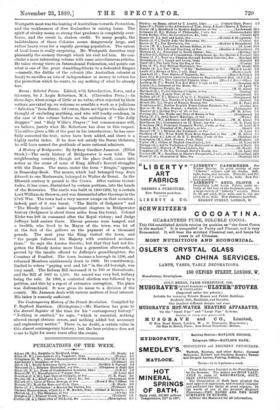A History of Bridgewater. By Sydney Gardner Jameson. (Elliot Stock.)--The
early history of Bridgewater is soon told. The neighbouring country, though not the place itself, comes into notice as the scene of some of King Alfred's fiercest struggles with the Danes. The name, under the form " Brugie," appears in Domesday-Book. The manor, which had belonged temp. Regis Eduardi to one Merleswain, belonged to Walter de Donai. In the fifteenth century it passed to the Crown. After various vicissi- tudes, it has come, diminished by certain portions, into the hands of the Bouveries. The castle was built in 1200-1202, by a certain Lord William de Briewor, and was dismantled after the siege in the Civil War. The town had a very narrow escape on that occasion ; indeed, part of it was burnt. " The Battle of Sedgmoor " and "The Bloody Assize" make important chapters in Bridgewater history (Sedgmoor is about three miles from the town). Colonel Kirke was left in command after the Royal victory ; and Judge Jeffreys held assizes there. Eleven persons were hanged, and a twelfth, who lived to be Mayor of the town, was let off at the foot of the gallows on the payment of a thousand pounds. The next year the King visited the town, and " the people followed his Majesty with continued acclama- tions." So says the London Gazette ; but that they had not for- gotten the Bloody Assize more than a generation afterwards, is proved by the insults offered to Jeffreys's granddaughter, the Countess of Pomfret. The town became a borough in 1296, and returned Members continuously down to 1868. Its constituency, limited to voters "paying scot and lot" in the old borough, was very small. The Reform Bill increased it to 700 or thereabouts, and the Bill of 1867 to 1,500. Its record was very bad, bribery being the rule. In 1868, a contested election was followed by a petition, and this by a report of extensive corruption. The place was disfranchised. It now gives its name to a division of the county. Mr. Jameson deals with various matters of local interest. His index is scarcely sufficient.






































 Previous page
Previous page